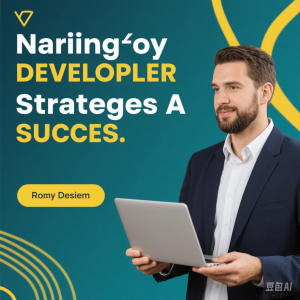Advanced Strategies for Developer Career Progression

In the ever – changing landscape of the technology industry, developers face a multitude of challenges and opportunities in their career development. This article delves into some advanced strategies that can help developers take their careers to the next level.
Navigating Career Transitions: From Generalist to Specialist
- Identifying Your Niche
As a developer, starting out as a generalist can be beneficial as it exposes you to a wide range of technologies and concepts. However, as your career progresses, identifying a niche can set you apart. For example, if you have a background in web development and notice a growing demand for blockchain – based applications in the finance sector, you could focus on becoming an expert in blockchain – enabled web development. This might involve learning about blockchain platforms like Ethereum, understanding smart contract development, and studying how to integrate blockchain technology into web applications. By specializing, you become more valuable in the job market as companies often seek developers with in – depth knowledge in specific areas.
- Acquiring Specialized Skills
Once you’ve identified your niche, the next step is to acquire the necessary specialized skills. This could involve taking advanced courses, earning certifications, or participating in relevant projects. For instance, if you decide to specialize in artificial intelligence for healthcare, you might take courses on medical image analysis, natural language processing for medical records, and machine learning algorithms applied to disease prediction. Certifications such as the Google Cloud Professional – AI Engineer or the Microsoft Certified: Azure AI Engineer Associate can add credibility to your skills. Additionally, working on real – world projects, like developing an AI – powered diagnostic tool for a local hospital, can give you hands – on experience and a tangible portfolio to showcase your expertise.
Choosing the Right Path: Technical vs. Managerial Roles
- Evaluating Your Interests and Strengths
Developers often face the decision of whether to pursue a technical or managerial career path. To make this decision, it’s crucial to evaluate your interests and strengths. If you have a passion for solving complex technical problems, staying at the forefront of technology trends, and enjoy writing code, a technical path might be more suitable. On the other hand, if you are good at leading teams, coordinating projects, and communicating with stakeholders, a managerial role could be a better fit. For example, some developers find great satisfaction in being a principal software engineer, where they can lead technical initiatives, mentor junior developers, and architect complex systems. Others thrive as project managers, responsible for ensuring projects are delivered on time, within budget, and meet the client’s requirements.
- Understanding the Skill Sets Required
Each path requires a different set of skills. Technical roles demand in – depth knowledge of programming languages, algorithms, and software development methodologies. As you progress in a technical career, you may need to learn advanced concepts such as distributed systems, cloud – native architectures, and security protocols. In contrast, managerial roles require skills in project management, team leadership, and communication. A project manager needs to be proficient in using project management tools like Jira or Asana, understand resource allocation, and be able to effectively communicate with different teams, including developers, designers, and clients. By understanding these skill sets, you can better prepare yourself for the path you choose.
Building a Personal Brand: Standing Out in the Developer Community
- Sharing Your Knowledge and Projects
Building a personal brand as a developer is essential for standing out in the competitive tech industry. One way to do this is by sharing your knowledge and projects. You can start a personal blog where you write about your experiences with different technologies, share code snippets, and explain how you solved complex problems. For example, if you worked on a project that optimized the performance of a large – scale e – commerce website, you could write a series of blog posts about the techniques you used, such as caching strategies, code optimization, and database indexing. Additionally, sharing your open – source projects on platforms like GitHub can attract attention from other developers and potential employers. Make sure to write clear documentation for your projects, so others can easily understand and contribute to them.
- Engaging in the Developer Community
Another aspect of building a personal brand is engaging in the developer community. Participate in online forums like Stack Overflow, where you can answer questions, share your expertise, and learn from others. Attend local and international developer conferences, meetups, and hackathons. At these events, you can network with other developers, showcase your projects, and stay updated on the latest industry trends. For example, presenting a talk at a developer conference about a new technology you’ve mastered can position you as an expert in that area. By actively engaging in the community, you build relationships, gain visibility, and enhance your reputation as a knowledgeable and passionate developer.
Leveraging Mentorship and Coaching for Growth
- Finding the Right Mentor
Mentorship can play a crucial role in a developer’s career development. A mentor can provide guidance, share their experiences, and offer valuable advice. To find the right mentor, look for someone who has achieved what you aspire to in your career. This could be a senior developer in your company, an industry expert, or a successful entrepreneur. Reach out to them, explain your career goals, and ask if they would be willing to mentor you. For example, if you want to start your own software startup, finding a mentor who has successfully founded and grown a tech company can be invaluable. They can guide you through the process of idea validation, fundraising, team building, and product development.
- Benefiting from Coaching
Coaching is another powerful tool for growth. A coach can help you identify your strengths and weaknesses, set goals, and develop an action plan to achieve them. Unlike a mentor, who is usually someone with more experience in your field, a coach can be a professional with expertise in areas like leadership development, career transition, or personal growth. For example, a coach can help you improve your communication skills, which are essential for both technical and managerial roles. They can provide feedback on your presentation skills, help you become a more effective communicator in team meetings, and teach you how to handle difficult conversations with colleagues or clients.
Balancing Work – Life and Professional Development
- Setting Boundaries
In the fast – paced world of technology, it’s easy to get caught up in work and neglect your personal life. To maintain a healthy work – life balance, it’s important to set boundaries. For example, define your working hours and stick to them as much as possible. Avoid checking work emails or messages outside of these hours, unless it’s an emergency. If you work from home, create a dedicated workspace that you can separate from your living area. This helps you mentally switch off from work when you’re not in that space. By setting boundaries, you can reduce stress and have more time for activities that recharge you, such as spending time with family and friends, pursuing hobbies, or exercising.
- Incorporating Learning into Your Routine
Despite the need for work – life balance, professional development should not be neglected. One way to achieve this is by incorporating learning into your daily routine. For example, you can set aside 30 minutes each day to read technical articles, watch online tutorials, or practice coding. You can also join online learning communities or study groups where you can learn from others and stay motivated. If you’re short on time, consider listening to podcasts about technology while commuting or doing household chores. By making learning a regular part of your routine, you can continuously improve your skills without sacrificing your personal life.
In conclusion, by implementing these advanced strategies, developers can enhance their career progression, build a successful career, and lead a balanced life. The technology industry offers numerous opportunities, and with the right approach, developers can make the most of them.




